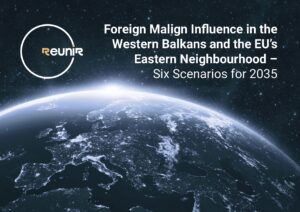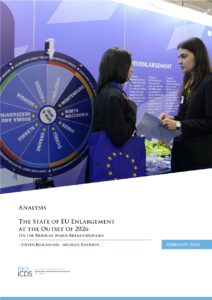WP1: Coordination, data management and ethical framework
Led by: CEPS
WP1 will ensure all objectives are met with maximum quality, efficacy, and ethical responsibility, maintaining constructive dialogue within the Consortium and with stakeholders across all WPs.
WP2: Risk, uncertainty and power: revisiting the origins and evolutions of EU enlargement and neighbourhood policies
Led by: UM
The main objective of this WP is to engage partners in problem structuring by revisiting the origins and historical evolution of the EU enlargement and neighbourhood policies and offering an innovative conceptual understanding of how the EU has advanced its values and interests under conditions of risk and uncertainty in the WB and EN. It will cross-fertilise various strands of EU scholarship such as geopolitics, resilience, economic interdependence, democratisation and the IR literature on power relations in order to set the stage for the empirical WPs. It will examine EU practices in the enlargement and Eastern neighbourhood policy contexts through the innovative conceptual lens of control and protean power. This will allow us to update our conceptual tools and better grasp how the EU has coped with the threats, risks, and uncertainty in its south/eastern surroundings.
WP3: Security resilience
Led by: ICDS
Specific objectives:
- Analyse the military threats posed by Russia, China and other state actors to EN & WB countries
- Assess the resilience to military threats of the EN & WB countries
- Assess the effectiveness of the EU’s CFSP, CSDP, neighbourhood, and enlargement toolboxes in assisting the EN & WB countries’ response to military aggression by Russia, China and other state actors
- Identify the unexploited potential for a more resilient and stronger EU foreign, security and defence toolbox to counter military threats on the European continent
WP4: Socio-economic resilience
Led by: CEPS
This Working Package will address political exploitation of socio-economic interdependencies: threats and resilience. Specific objectives:
- Analyse the threats posed to EN & WB countries by the political exploitation of socio-economic dependencies on Russia, China and other relevant countries
- Assess the resilience to socio-economic threats of EN & WB countries.
- Identify the unexploited potential for a stronger EU neighbourhood and enlargement toolbox to counter socio-economic threats on the European continent and formulate evidence-based policy proposals for the short-term
WP5: Democratic resilience and EU political perspectives on relations with the WB&EN
Led by: SN, BCSP
The WP will focus on political perspectives on EU democratisation policies vis-à-vis, and relations with the Western Balkans and Eastern Neighbourhood.
Specific objectives:
- Analyse the threats posed by Russia, China and other relevant state actors (e.g., Turkey) to democratisation and political stabilisation in EN & WB countries
- Assess the resilience of the EU’s regional and country-specific policies and initiatives aimed at democratising and stabilising the EN & WB countries
- Map EU actors’ political approaches to existing policies vis-à-vis, and future relations with EN/WB countries
- Formulate evidence-based proposals to reform the EU’s enlargement methodology and EaP, including assessment criteria to determine the adherence of EN & WB countries, and proposals to decide on gradual integration, as well as strengthening or reversing association to the EU.
WP6: Perceptions from the Eastern neighbourhood and Western Balkans
Led by: NaUKMA, UG
Specific objectives
- Map the perception of the EU and other external actors in the EN & WB countries
- Analyse local actors’ perceptions of key policy areas, such as democratisation, socio-economic relations and military security, and their linkages to EU and other actors
- Identify regional differences and similarities in regard to the perception of the EU and other external actors and their interrelationship
- Formulate evidence-based proposals for the EU based on the perception of the EU and other actors in the WB & EN countries, improving the preparedness of EU programmes for attitudinal shifts in these regions
- Connect research and researchers working on and from EN and WB with each other, creating new linkages and exchange of knowledge between the two regions
WP7: Anticipating future threats
Led by: GPPi
Anticipating future threats by global and regional powers will be addressed using scenarios, forecasts and strategic foresight. Building on the threat and capability assessments produced by WPs 3/4/5, WP 7 will leverage qualitative and quantitative methods from the strategic foresight (incl. scenario building and analysis) and forecasting toolbox to:
- refine methodologies for the purpose of forecasting, scenario-building and strategic foresight of geopolitical threats with a view to identifying opportunities for improving prevention, resilience, and response;
- develop a set of exploratory scenarios and forecasts to identify and assess known and novel threats to the countries of the Eastern Neighbourhood and Western Balkans related to the geopolitical ambitions of Russia, China and selected other powers towards these regions (with a time horizon toward 2030-35);
- undertake strategic foresight analysis to identify, assess and prioritise gaps in how prepared the EU, its member states and the countries of the EN and WB are to prevent, respond to and mitigate the consequences of the threats identified, with a view to feeding into the development of policy recommendations in WP8.
WP8: Policy prescription
Led by: COEN, IPRE
The WP8 will bring forward the proposals for integrated EU external action toward the Western Balkans and the Eastern neighbourhood. The overarching objective of this WP is to develop a White Paper offering proposals for the improvement of the EU’s neighbourhood policy and accession process by drawing on evidence-based analysis in WP2-6 and grafting policy recommendations onto the scenarios of WP7. WP8 objectives:
- Take stock of the research carried out in the project (WPs 3-7) as well as of the existing strategic documents on EU external action. Review and synergise the recommendations developed in WP3-7.
- Develop a set of proposals that will make EU policies towards the EN & WB more resilient and effective. The preliminary set of proposals will be consulted with a range of key European stakeholders in order to ascertain that the proposals address the primary challenges and satisfy main objectives of the EU external strategy.
WP9: Dissemination, exploitation and communication
Led by: GIP, NTNU
This WP aims to ensure effective dissemination and exploitation of results among policy/expert communities in order to raise awareness about an improved EU neighbourhood and accession policy, potential future action on the part of competing external actors, and measures destined to strengthen the EU’s resilience and foreign policy toolkit against military threats. Its pathways to impact entail that it will reach out to, and systematically engage with, expert communities, officials and citizens from the EU, member states and both the Eastern neighbourhood and the Western Balkans. To this end, WP9 will create a tangible visible identity, tailor project results to selected audiences, generate synergies with key multipliers and similar projects, and further knowledge/collaboration among consortium partners.


